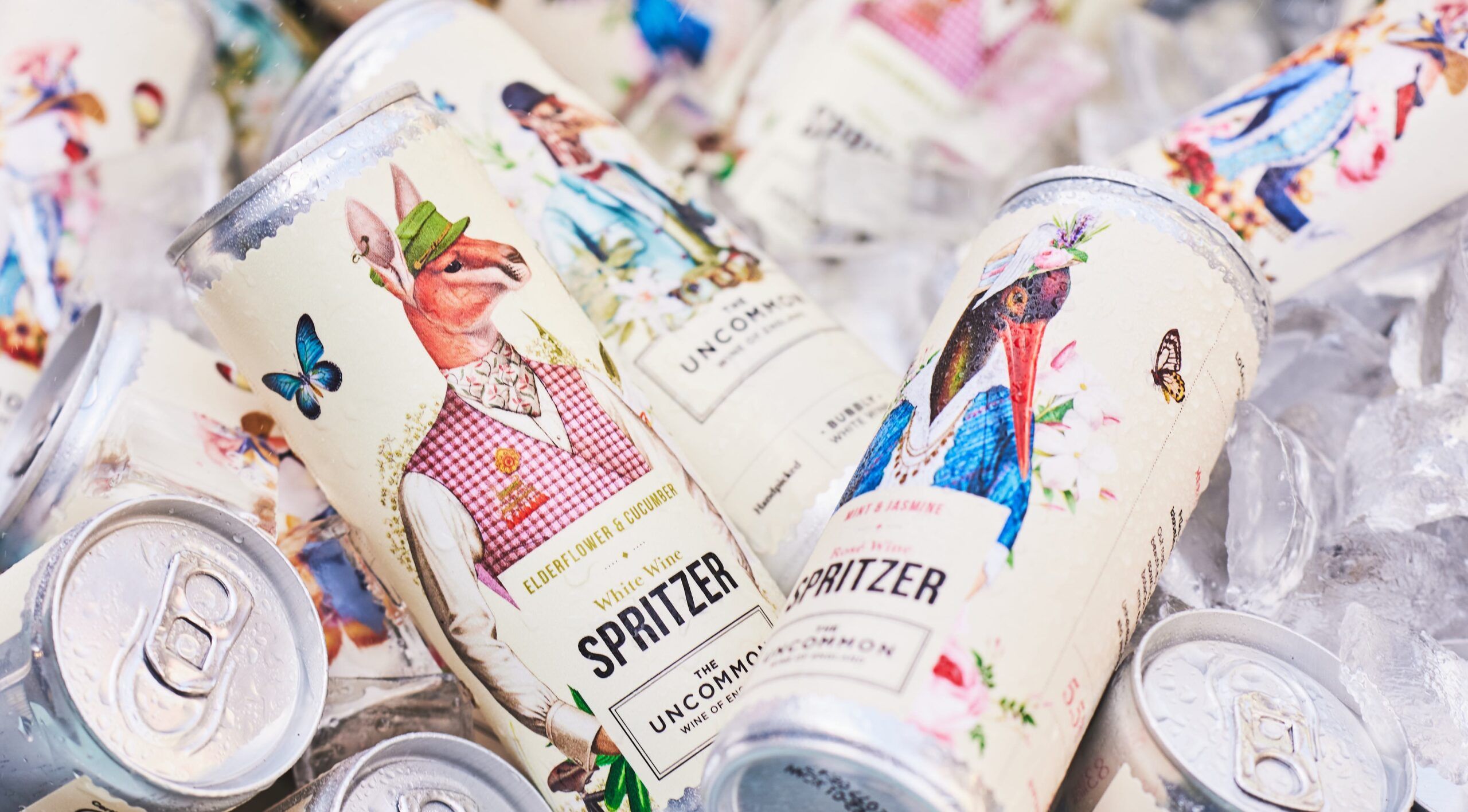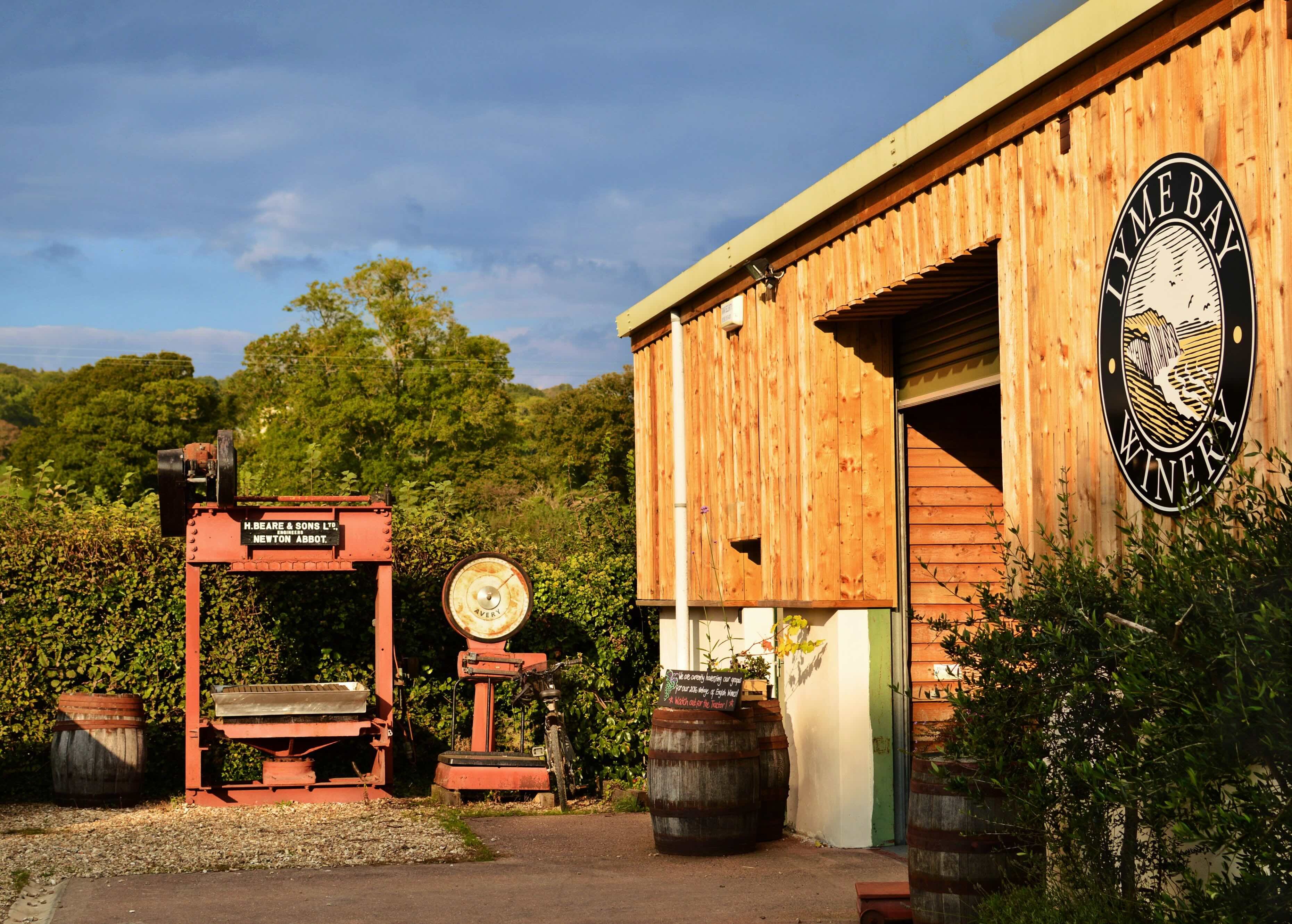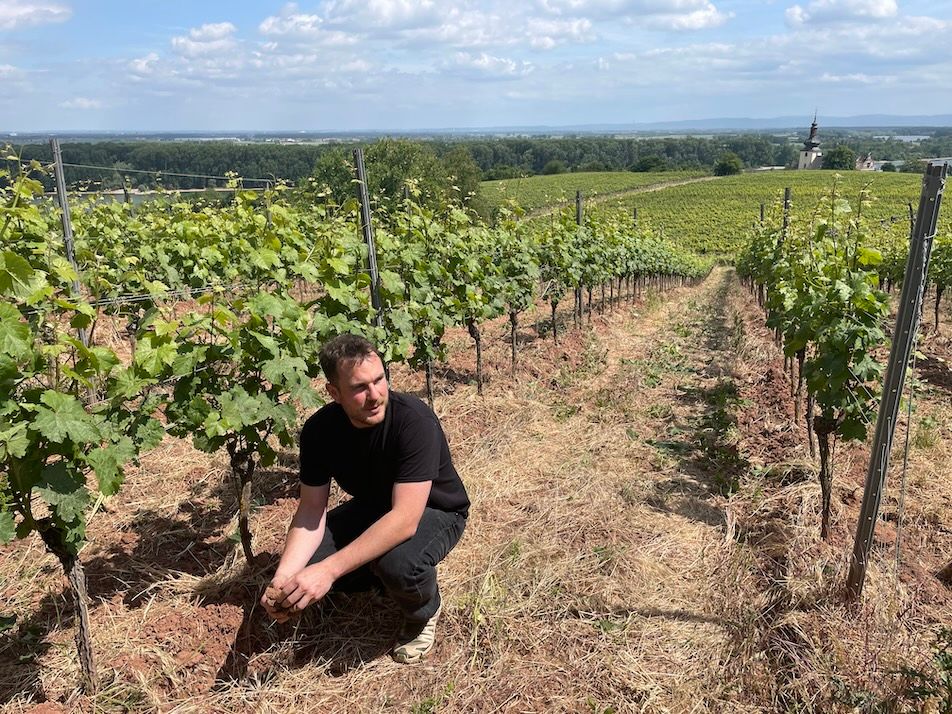The Uncommon wine brand is reaching parts of the wine market other canned wines can’t – including being served in First Class on Virgin Atlantic flights. Here’s its story.
“I knew there was a market out there for canned wine and then basically worked back from there.” That’s how Henry Connell says he first came up with the idea, along with his co-founder, Alex Thraves, for what has gone on to become the award-winning Uncommon English sparkling wine brand in a can.
The fact neither Connell nor Thraves worked in the wine industry at the time was probably a help too. If they did then they might have seen a lot more negatives than positives about the idea. Does wine in a can even work? Never mind sparkling wine. English wine? Forget it.
But Connell and Thraves were convinced that with the right product they could make canned wine work.
“We really believed in the can format and that there was a market out there for it from the start. The majority of the English wine industry is very traditional and we thought there was room for innovation and to do some cool stuff. We knew we could appeal to a different type of customer,” he explains.
Connell was also living in New York at the time, in his previous career in consultancy, and could see how quickly the US consumer had taken to cans, be it for beer, hard seltzers and for wine. Why wouldn’t the UK consumer, particularly younger drinkers, do the same if they had the right products to buy? It was also from a sustainability point of view such a stark contrast to a traditional glass bottle.
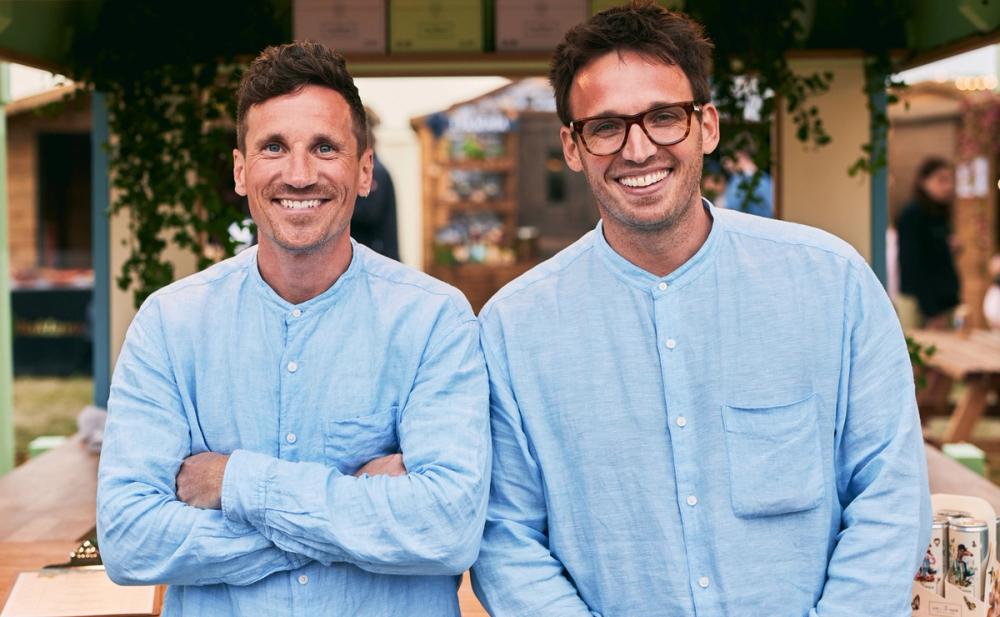
The Uncommon wine brand – co-founded by Henry Connell and Alex Thraves – has won plaudits, customers and consumers thanks to the quality of the wine but also the innovative eye-catching design
To help turn their idea of a canned wine into reality Connell was able to call on an old school mate, Phil Norman, who had gone on to enjoy a career in viticulture & oenology in Burgundy, New Zealand and South Africa.
“We caught up, discussed the opportunity and what was missing in the industry and that was it,” says Norman.
Connell realised he needed to have some credible wine experience behind him and enrolled on the viticulture and oenology course at Plumpton College, gaining experience at Hattingley Valley and Nyetimber along the way.
Putting English wine in a can
When the idea had progressed as far as a brand name – The Uncommon – the challenge was not just making a quality local sparkling wine, but one that could work in a can.
Norman admits the first couple of attempts ended up “being a bit of a disaster” with acidity, PH and Sulphur levels way off what they were looking for and a far cry from the bright, refreshing sparkling wine full of aromatics they were hoping to make.
“Off the first 10,000 cans we did we probably lost around two to three thousand due to technical issues with the can,” says Connell. Which is perhaps not surprising considering they were working with canning companies used to working with apples and other fruits.
Norman says his experience of working with Pinot and Chardonnay in Burgundy has been particularly useful and understanding just how careful you have to be with the grapes at each stage to get the quality you want. After numerous trials it became clear that Bacchus was the grape variety that could give it the right balance between early ripening for freshness and vibrancy, but also its sugars and PH levels too.
Over time they were able to work with their winemaker to craft a non-traditional method sparkling wine they felt had the right level of energy and freshness to work in a can.
Now they are securing fruit from different counties across the south of England and have built up an extensive knowledge of which styles, varieties and clones work best in different areas and regions.
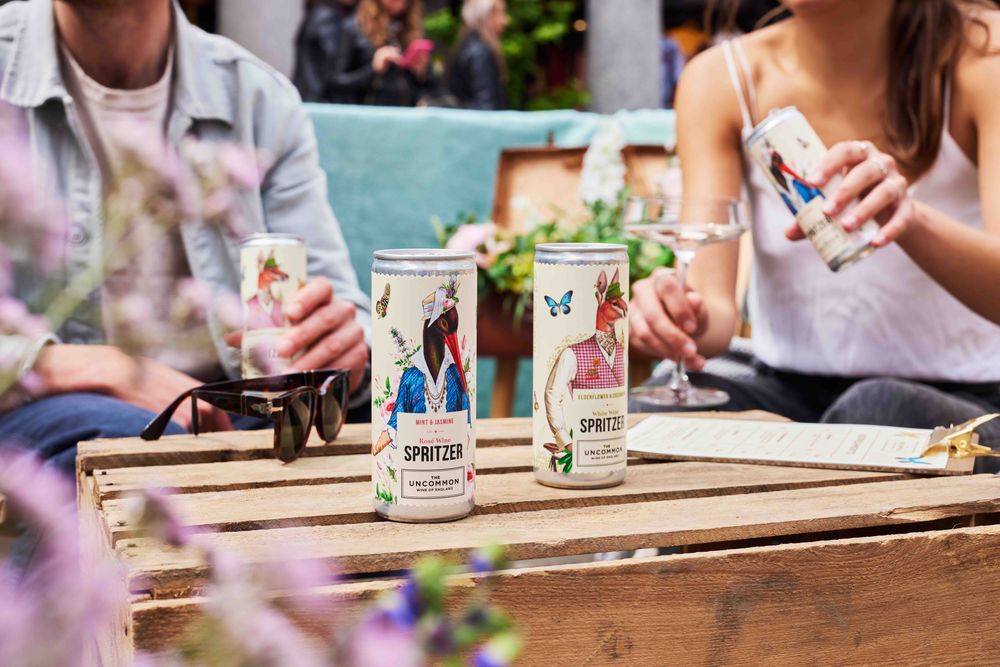
The Uncommon can is one you put pride of place next to your glass
“From a winemaking point of view, we are looking for early ripening clones,” says Norman. “The combination of the right clones is what gives you the complexity, the aromatics and flavour profile.”
But he admits it is “definitely a challenge” to get the winemaking right. Which is also why they are doing more “small batch winemaking” using between 10 to 20 tonnes of fruit at a time that “can all be vinificated separately”.
“You can’t make good wine from bad grapes – particularly in a can,” he adds. “As your parameters are so much tighter, your PH and SO2 levels need to be spot on. We have worked really hard to find the good growers on good sites who know what they are doing. Our knowledge of growers is way better than it used to be and that is crucial. But we are still learning all the time.”
He says by picking and working with grapes from different counties it also spreads the risk depending on problems with the vintage, and how different crops perform county to county.
It’s why, from day one, they invested part of their start up cash to work with growers to plant their own vines on any excess land they have. The 13 hectares of vines they laid down in Kent in 2018 should start to bear fruit this year
“We are now looking to plant another 50 to 60 hectares in another county. It’s a big stress but it’s also very good to have. It’s also a very good way to really learn and understand different harvests.”
Their risk is slightly mitigated by the fact the land is owned by the grower and they have made a commitment to buy fruit from them for the next 20 to 25 years.
Norman says it is a similar relationship and partnership that you see in Burgundy between producers and growers.
“From a funding perspective it is not best for us to be acquiring our own land. This way we can work with good farmers who grow high quality grapes,” adds Connell.
Tasting Good…Looking Good
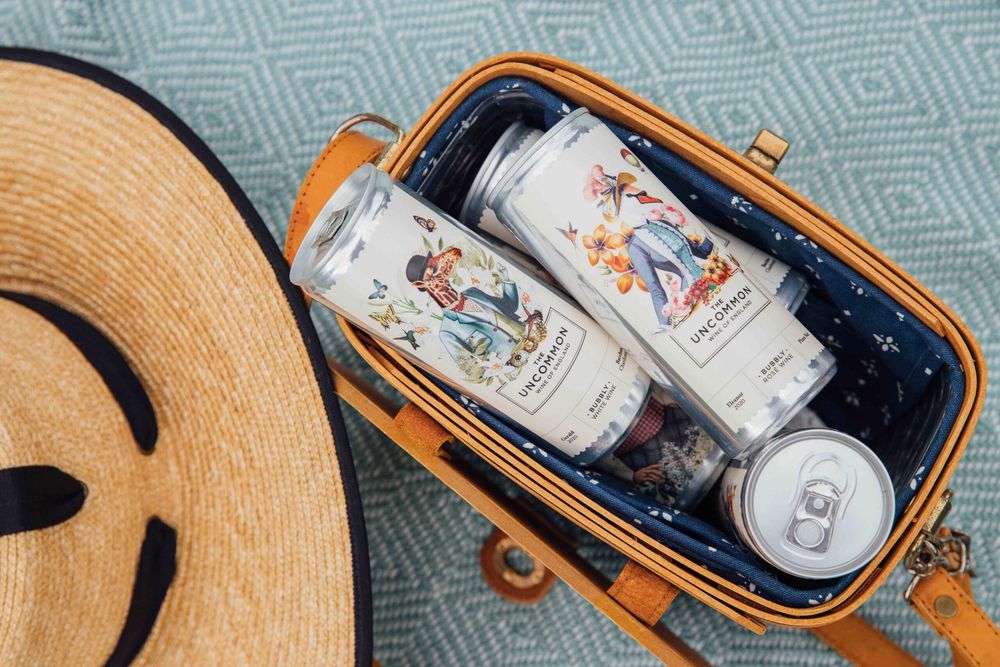
A brand designed to put in your handbag and go wherever you go…
For their premium English wine in a can concept to work they needed it to look as good as it tasted. Which is where Thraves’ skills as a graphic designer have really come to the fore, creating a design that has gone on to win multiple awards and created an image, personality and tone of voice for the overall brand.
“We needed the wine to taste good and the can to look good,” says Connell.
They also wanted a design that would appeal to a potential new audience of wine drinkers, rather than the traditional red trouser brigade.
Hence the rather “uncommon” and attention-grabbing design based on creating a family of unusual, quirky and what you might call “English” characters, says Connell. “We have hopefully created characters that are a nod to Victorian England. We worked with an artist to help create them.”
He says the impact of the design has really worked with consumers. “I would say 99% of people will talk about the branding before they do the wines.”
It is, though, a crucial part of its ambition to “own both the premium end of the canned English wine market and the premium alternative format market,” adds Connell.
“It’s all part of the consumer experience we want to have with our wine. The attention to detail on the can is all part of it, right through to the aesthetics of the packaging.”
Buy a small pack of The Uncommon cans and they come in a wonderfully designed box which is not too dissimilar to unpacking a new iPhone for the first time.
Big Break
They also needed good distribution and they say they will always be grateful to the late Terry Threlfall, then wine buyer at Selfridges, for taking the plunge and agreeing to give them their first major listing.
“He had great faith in what we were doing and once we had the Selfridges’ seal of approval it meant we were then able to talk to the likes of Marks & Spencer, Fortnum & Mason, Waitrose, Planet Organic,” says Connell.
Its distribution strategy is very much focused on building its network in the specialist, premium on and off-trades. It has brought in Ben Williams from Fever Tree to head up its sales and, in particular, look to push the brand more into the on-trade.
“We are confident this is a brand that can work just as well in the off or on-trade. So far, the low hanging fruit has been the specialist retail sector but we are now starting to get traction in pubs and bars where we can help them with the quick serve and we are keen to grow that part of the business,” says Connell.
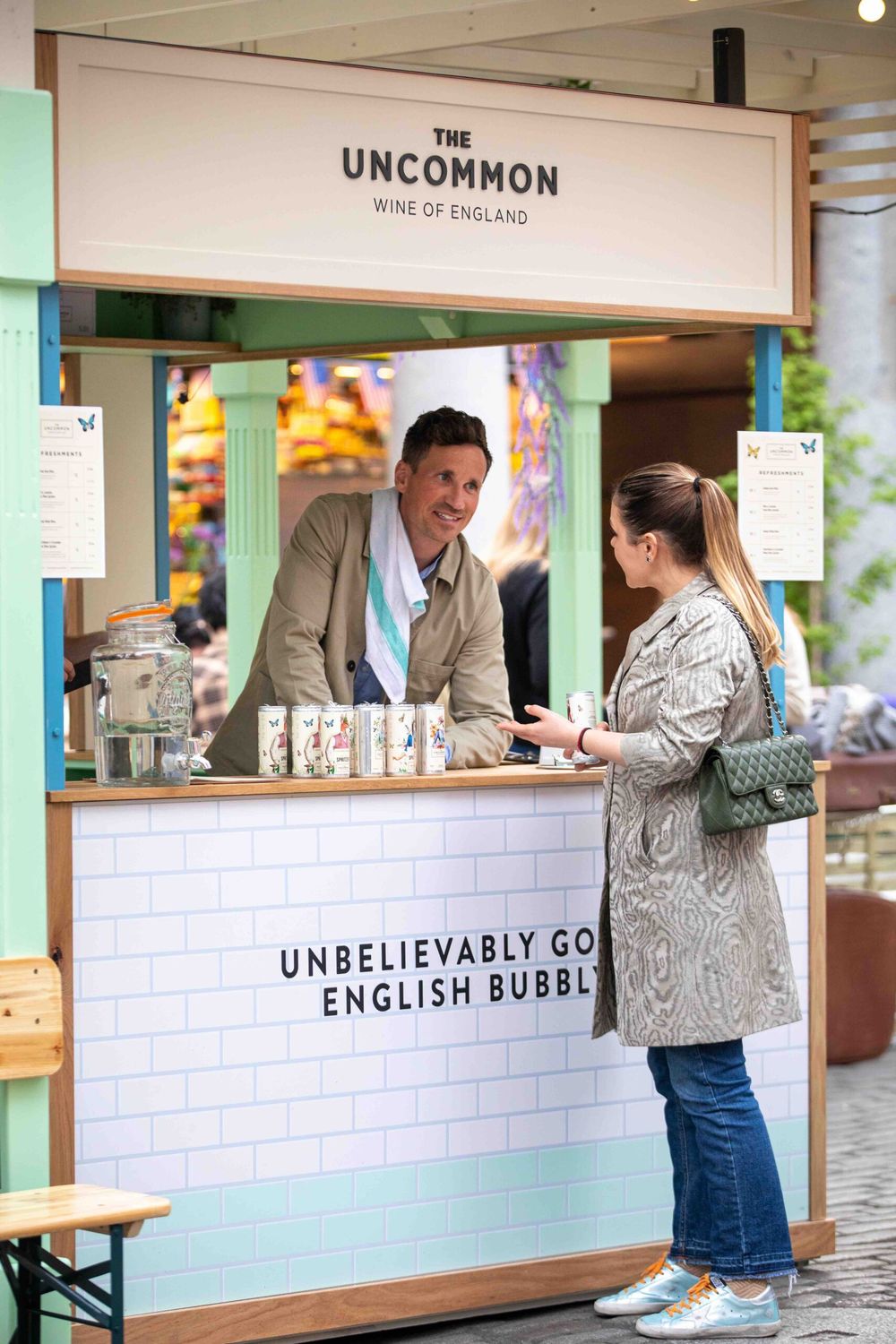
The Uncommon team have been able to promote and spread the word of The Uncommon and foodie and drinks festivals across the UK.
Act and think locally
A key part of The Uncommon’s trading model and also marketing message is that it looks where possible to source and only work with local suppliers. It is committed to only working with English vineyards and growers based within 50 miles of London. It has even taken on its sustainability credentials as far as being, what it claims, the only B Corp certified wine brand in the UK.
This approach also stretches to how they want to build The Uncommon’s potential business outside of the UK. Rather than follow the traditional route and get distributors in different markets to sell its English wine in a can, it is looking at how it can set up separate The Uncommon businesses in local winemaking countries and regions and replicate what it is doing in the UK, but make wine in a can based on locally grown grapes that they then look to sell in that market.
It is looking to start out The Uncommon in New Zealand and make and sell wine there and then look to move to other countries if it is a success. The New Zealand operation is to be headed up by one of their former PR consultants who has moved to the country and keen to help set up there.
“We want to celebrate local winemakers and the local communities they come from that can also express that local culture in all the marketing we do,” says Connell. “If we make and sell our brands in the local market then we can be much lower carbon footprint and can stay true to our values of making a local brand. We really think this is a truly sustainable business model.”
He says putting the steps in to gain B Corp status was a big commitment, but not only is it the right thing to do it also opens the business up to a strong network of like-minded businesses in other sectors that they can learn so much from.
“It also highlights areas where we can do better.”
Connell stresses the can aspect of the business actually had very little to do with them getting B Corp status. It was much more to do with what it was doing with its supply chain. It is also how as a business you are using your money to invest in sustainability projects and community schemes to help create a virtuous business cycle.
That focus on sustainability and acting locally is a little stretched when you consider its cans are filled by Greencroft Bottling, part of the Lanchester Group and Lanchester Wines, based in Durham. But Connell says the sustainability credentials of Greencroft and wider Lanchester Group are so high and demanding that more than compensates not working with more local business. But then how many canning lines can you find in Kent, Surry and Sussex?
“They have been amazing for us and we have worked really closely together on what works in a can,” says Connell.
Lessons learned
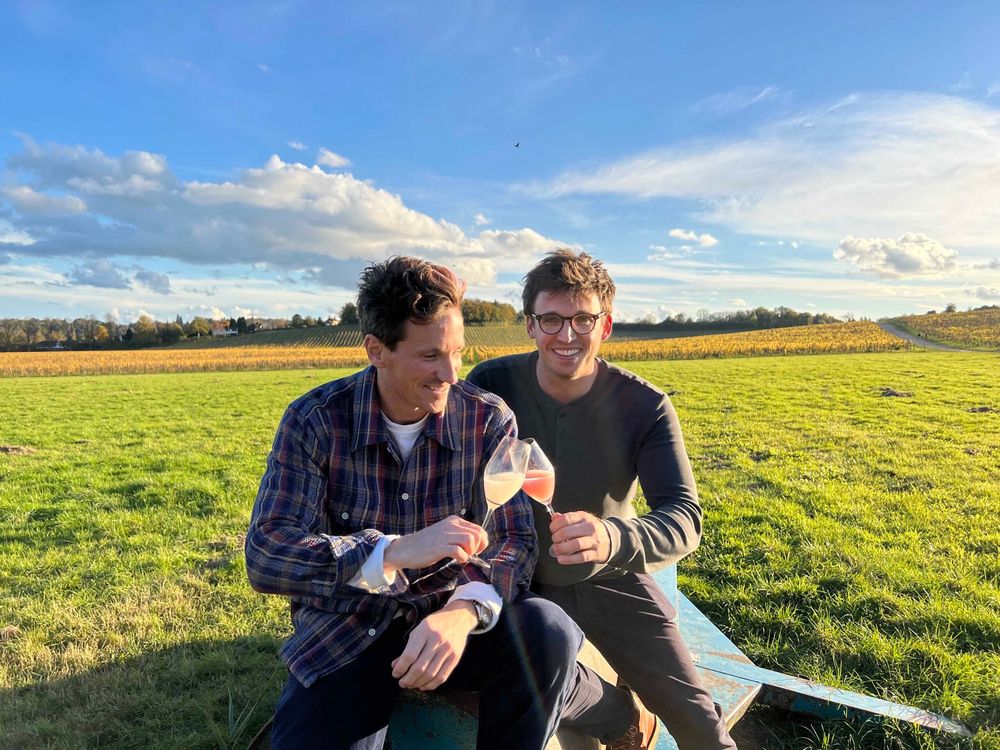
The Uncommon’s Henry Connell and Alex Thraves says the can market has moved on so much since they first launched six years ago
Connell says the business has been through a lot in the last six years, and can look back with some pride that it has played its part in not just the English wine success story, but what is happening in the can market.
“If we were doing it again now it would be a whole lot easier. Six years ago, sparkling English wine in a can was nonexistent,” he says.
“We have made a lot of mistakes along the way. The market was certainly not ready for us when we first started out. But now we have the experience, the knowledge in what we need from our winemakers, our growers, our suppliers.”
It has also taken three rounds of funding and investment to keep the business pushing forward – largely to date relying on friends, family and “high net worth individuals” who want to support what they are doing. But it might need to look at a more institutional raise in the next year or so.
From a team of two it has now grown to 11 and will be looking to take on more as the company grows.
“I could not be happier with the team we have. Everyone is an expert in their field, and it feels right for the size of business we are. We can also stand up and talk about clones and yeasts and show we are a serious winemaking company first and foremost,” says Connell.
It has also built up its own loyal community – The Uncommoners – that have signed up for newsletters and regularly come to tastings and special events they put on. They expected their audience would be made up of mostly 20 to 35 years olds, when in reality it is the 35 to 50 plus who have really bought into the brand, its values and what it stands for and means to them.
“We don’t look to bamboozle them about wine. We always try and keep that outsider perspective and help them understand what we are doing and the difference we are trying to make.”
The Uncommon is in real danger of not being uncommon at all.
- If you want to find our more about The Uncommon go to its website here.
